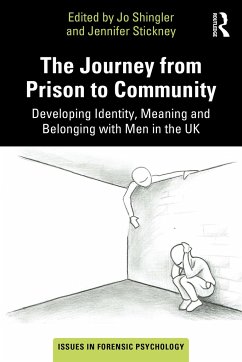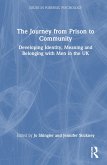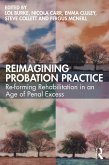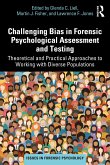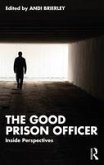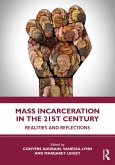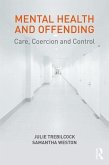The Journey from Prison to Community: Developing Identity, Meaning and Belonging with Men in the UK provides a practical guide for practitioners working with men to successfully make the transition between prison and the community.
This transition presents significant challenges, especially for those who have served many years in prison; for those who have experienced multiple cycles of release/recall; for those whose personality traits make it harder for them to build relationships and cope with strong emotions; and for those whose lives have been characterised by trauma, chaos, crime and institutionalisation. Drawing on the authors' clinical expertise and the lived experiences of real service-users, alongside the latest research in the field, the book identifies key issues in transition and explores the impact of these issues. Crucially, it provides guidance, tools and support to professionals working with men in the UK to build a crime-free, socially integrated andmeaningful life after incarceration, featuring real-life stories of those who have made the transition.
This is an essential read for professionals working in a range of settings across prison and community environments, while the wide variety of professional experience represented in the book broadens its appeal to forensic and clinical psychologists, occupational therapists, probation officers, prison staff and those working in the third sector. It is also valuable resource for qualified professionals, those in training, support roles, and managers involved in planning strategy and service delivery.
This transition presents significant challenges, especially for those who have served many years in prison; for those who have experienced multiple cycles of release/recall; for those whose personality traits make it harder for them to build relationships and cope with strong emotions; and for those whose lives have been characterised by trauma, chaos, crime and institutionalisation. Drawing on the authors' clinical expertise and the lived experiences of real service-users, alongside the latest research in the field, the book identifies key issues in transition and explores the impact of these issues. Crucially, it provides guidance, tools and support to professionals working with men in the UK to build a crime-free, socially integrated andmeaningful life after incarceration, featuring real-life stories of those who have made the transition.
This is an essential read for professionals working in a range of settings across prison and community environments, while the wide variety of professional experience represented in the book broadens its appeal to forensic and clinical psychologists, occupational therapists, probation officers, prison staff and those working in the third sector. It is also valuable resource for qualified professionals, those in training, support roles, and managers involved in planning strategy and service delivery.
'This is an exceptional book that digs deep into the complexities and challenges of community reintegration for individuals leaving custody. Jo Shingler and Jennifer Stickney do an outstanding job of bringing together the limited research in the area, and this is illustrated throughout with examples of what works (and what doesn't) from experts in the field. The voices of men who have lived (and sometimes failed) experience of community reintegration are loud and clear in this volume and we need to listen to them. This book has the potential to change resettlement practice for the better and it deserves to be on the bookshelf of every criminal justice practitioner and parole board member in the country.' Dr Louise Bowers, HCPC Registered Forensic Psychologist, Director of The Forensic Psychologist Service, UK
'This insightful and often moving book focuses on the transition from prison into the community. Written collaboratively by scholars, community practitioners and people with lived experience, it discusses the practical, psychological and emotional challenges encountered on release and explores ways in which people can be supported. Many chapters reflect on trauma, commonly aggravated by imprisonment itself, and the incessant difficulties posed by these experiences, interacting so painfully with the stigma that many encounter. The book will be of value to researchers and practitioners, but also to those anticipating their own release from prison. Among the powerful messages from this volume is that, in a criminal justice culture preoccupied with punishment, risk and monitoring, it is usually kindness, genuineness and trust that work best in supporting desistance.' Rob Canton, Professor Emeritus, De Montfort University, UK
'This impressively researched book is very obviously grounded in an intimate knowledge of prisons and the people in them, and has much practical advice to offer. In offering a theoretical framework for the unsung work of so many different people it has the potential to improve outcomes - but also perhaps to raise the status of that work in the eyes both of the public and those delivering it.' Peter Dawson
'This book is a valuable resource for clinicians working within criminal justice and those with an interest in the system and people it cares for. It shines a light on a wide range of issues that men resettling from prison experience from the perspective of clinicians and other practitioners, together with the academic evidence that gives context to their stories. It provides an insight into the people behind the processes and provides tools and practices to support their successful progression from custody to the community.' Chris Gunderson, Head of Future Regime Design in Prisons, HM Prison & Probation Service, UK
'This book marks a paradigm shift for forensic practitioners, providing a voice to the people we work with by co-creating a resource that is essential for both practitioners and aspiring practitioners. It focusses on lived experience; what it feels like, is like for people who know the pain of imprisonment and who face the challenges of leaving prison, reconnecting with society and recovery. In particular it focuses on what it is like to work with professionals as they take this journey. Those authentic, lived experiences call for us 'professionals' (also human beings) to change, to be more genuine, compassionate, human as we work with people on their journey through and out of prison. I want to thank the authors for creating this book, for shining a light for the future of our profession and providing much needed direction.' Dr Nic Bowes, Forensic Psychologist, Reader in Forensic Psychology at Cardiff Metropolitan University, Chair of the British Psychological Society Division of Forensic Psychology, UK
'A volume aching with the recognition of mutual humanity, and what it means to better account for this when supporting those working to establish a life beyond the walls of prison. Contributors confront us with the multiple barriers - and trauma - efforts to resettle after prison are so often fraught with. In so doing they prompt us to meaningfully consider how we might better support those who live and work inside. A profoundly important contribution to the literature, offering no easy answers, but a multitude of creative and thoughtful insight about how we might do better.' Dr Kate Herrity, Research Fellow at Kings College, Cambridge University, UK
'This book represents a welcome multi-disciplinary addition to the literature on the issues and practicalities of supporting post-imprisonment resettlement. It brings useful frontline insights into the challenges and opportunities experienced by people on release, but also perspectives how and why these challenges develop. It is a valuable resource for multi-disciplinary practitioners seeking to tailor their approaches to more effectively meet the needs of people navigating life post-release.' Dr Catriona Connell, Occupational Therapist, Research Fellow, Salvation Army Centre for Addiction Services and Research, University of Stirling, UK
'Insightful and practical, this book demonstrates how the perspectives of experienced practitioners and their clients can be combined with research and theory to illuminate a multifaceted area which has often been poorly understood. It also leaves the reader in little doubt that the area of resettlement after custody is intrinsic to the effective operation, as well as the humanity, of the criminal justice system.' Dr Adrian Needs, Visiting Research Fellow, University of Portsmouth, UK
'This insightful and often moving book focuses on the transition from prison into the community. Written collaboratively by scholars, community practitioners and people with lived experience, it discusses the practical, psychological and emotional challenges encountered on release and explores ways in which people can be supported. Many chapters reflect on trauma, commonly aggravated by imprisonment itself, and the incessant difficulties posed by these experiences, interacting so painfully with the stigma that many encounter. The book will be of value to researchers and practitioners, but also to those anticipating their own release from prison. Among the powerful messages from this volume is that, in a criminal justice culture preoccupied with punishment, risk and monitoring, it is usually kindness, genuineness and trust that work best in supporting desistance.' Rob Canton, Professor Emeritus, De Montfort University, UK
'This impressively researched book is very obviously grounded in an intimate knowledge of prisons and the people in them, and has much practical advice to offer. In offering a theoretical framework for the unsung work of so many different people it has the potential to improve outcomes - but also perhaps to raise the status of that work in the eyes both of the public and those delivering it.' Peter Dawson
'This book is a valuable resource for clinicians working within criminal justice and those with an interest in the system and people it cares for. It shines a light on a wide range of issues that men resettling from prison experience from the perspective of clinicians and other practitioners, together with the academic evidence that gives context to their stories. It provides an insight into the people behind the processes and provides tools and practices to support their successful progression from custody to the community.' Chris Gunderson, Head of Future Regime Design in Prisons, HM Prison & Probation Service, UK
'This book marks a paradigm shift for forensic practitioners, providing a voice to the people we work with by co-creating a resource that is essential for both practitioners and aspiring practitioners. It focusses on lived experience; what it feels like, is like for people who know the pain of imprisonment and who face the challenges of leaving prison, reconnecting with society and recovery. In particular it focuses on what it is like to work with professionals as they take this journey. Those authentic, lived experiences call for us 'professionals' (also human beings) to change, to be more genuine, compassionate, human as we work with people on their journey through and out of prison. I want to thank the authors for creating this book, for shining a light for the future of our profession and providing much needed direction.' Dr Nic Bowes, Forensic Psychologist, Reader in Forensic Psychology at Cardiff Metropolitan University, Chair of the British Psychological Society Division of Forensic Psychology, UK
'A volume aching with the recognition of mutual humanity, and what it means to better account for this when supporting those working to establish a life beyond the walls of prison. Contributors confront us with the multiple barriers - and trauma - efforts to resettle after prison are so often fraught with. In so doing they prompt us to meaningfully consider how we might better support those who live and work inside. A profoundly important contribution to the literature, offering no easy answers, but a multitude of creative and thoughtful insight about how we might do better.' Dr Kate Herrity, Research Fellow at Kings College, Cambridge University, UK
'This book represents a welcome multi-disciplinary addition to the literature on the issues and practicalities of supporting post-imprisonment resettlement. It brings useful frontline insights into the challenges and opportunities experienced by people on release, but also perspectives how and why these challenges develop. It is a valuable resource for multi-disciplinary practitioners seeking to tailor their approaches to more effectively meet the needs of people navigating life post-release.' Dr Catriona Connell, Occupational Therapist, Research Fellow, Salvation Army Centre for Addiction Services and Research, University of Stirling, UK
'Insightful and practical, this book demonstrates how the perspectives of experienced practitioners and their clients can be combined with research and theory to illuminate a multifaceted area which has often been poorly understood. It also leaves the reader in little doubt that the area of resettlement after custody is intrinsic to the effective operation, as well as the humanity, of the criminal justice system.' Dr Adrian Needs, Visiting Research Fellow, University of Portsmouth, UK

